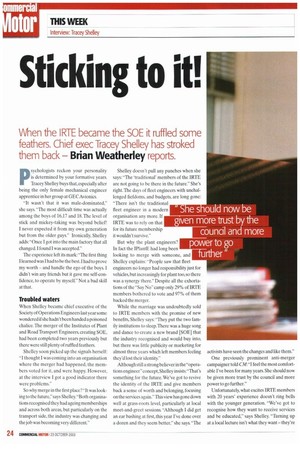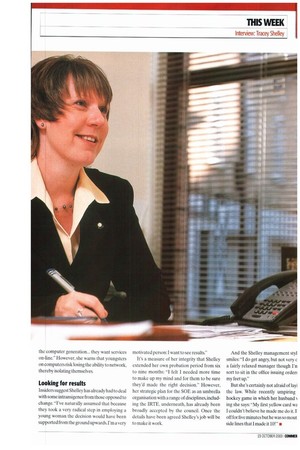Sticking to it!
Page 24

Page 25

If you've noticed an error in this article please click here to report it so we can fix it.
When the IRTE became the SOE it ruffled some feathers. Chief exec Tracey Shelley has stroked them back Brian Weatherley reports.
psychologists reckon your personality is determined by your formative years. Tracey Shelley buys that, especially after being the only female mechanical engineer apprentice in her group at GEC Avionics.
"It wasn't that it was male-dominated," she says. "The most difficult time was actually among the boys of 16,17 and 18. The level of stick and mickey-taking was beyond belief! I never expected it from my own generation but from the older guys." Ironically, Shelley adds: "Once I got into the main factory that all changed.1 found! was accepted."
The experience left its mark: "The first thing I learned was I had to be the best.I had to prove my worth and handle the ego of the boys. I didn't win any friends but it gave me self-confidence, to operate by myself." Not a bad skill at that.
Troubled waters
When Shelley became chief executive of the Society of Operations Engineers last year some wondered if she hadn't been handed a poisoned chalice. The merger of the Institutes of Plant and Road Transport Engineers. creating SUE, had been completed two years previously but there were still plenty of ruffled feathers.
Shelley soon picked up the signals herself: "I thought I was coming into an organisation where the merger had happened, the members voted for it, and were happy. However, at the interview I got a good indicator there were problems."
So why merge in the first place? -.1.1 was looking to the future,"says Shelley."Both organisations recognised they had ageing memberships and across both areas, but particularly on the transport side, the industry was changing and the job was becoming very different." But why the plant engineers? In fact the IPlantE had long been looking to merge with someone, and Shelley explains: "People saw that fleet engineers no longer had responsibility just for vehicles, but increasingly for plant too, so there was a synergy there." Despite all the exhortations of the "Say No" camp only 29% of IRTE members bothered to vote and 97% of them backed the merger.
While the marriage was undoubtedly sold to IRTE members with the promise of new benefits, Shelley says: "They put the two family institutions to sleep. There was a huge song and dance to create a new brand [S0E1 that the industry recognised and would buy into, but there was little publicity or marketing for almost three years which left members feeling they'd lost their identity."
Although still a strong believer in the"operations engineerconcept,Shelley insists:"That's something for the future. We've got to revive the identity of the IRTE and give members back a sense of worth and belonging, focusing on the services again." This view has gone down well at grass-roots level, particularly at local meet-and-greet sessions. "Although I did get an ear bashing at first, this year I've done over a dozen and they seem better," she says. "The activists have seen the changes and like them."
One previously prominent anti-merger campaigner told CM: "I feel the most comfortable I've been for many years. She should now be given more trust by the council and more power to go further."
Unfortunately, what excites IRTE members with 20 years' experience doesn't ring bells with the younger generation. "We've got to recognise how they want to receive services and be educated," says Shelley. "Turning up at a local lecture isn't what they want they're the computer generation... they want services on-line." However, she warns that youngsters on computers risk losing the ability to network. thereby isolating themselves.
Looking for results
Insiders suggest Shelley has already had to deal with some intransigence from those opposed to change. "I've naturally assumed that because they took a very radical step in employing a young woman the decision would have been supported from the ground upwards. I'm a very motivated person: I want to see results."
It's a measure of her integrity that Shelley extended her own probation period from six to nine months: "I felt I needed more time to make up my mind and for them to be sure they'd made the right decision." However, her strategic plan for the SUE as an umbrella organisation with a range of disciplines,including the IRTE. underneath, has already been broadly accepted by the council. Once the details have been agreed Shelley's job will be to make it work. And the Shelley management styl smiles: "I do get angry, but not very c a fairly relaxed manager though l'n sort to sit in the office issuing orderf. my feet up."
But she's certainly not afraid of layi the law. While recently umpiring hockey game in which her husband ing she says: 'My first yellow card wa I couldn't believe he made me do it. I off for five minutes but he was so mout side lines that I made it 10!" •
































































































































































































